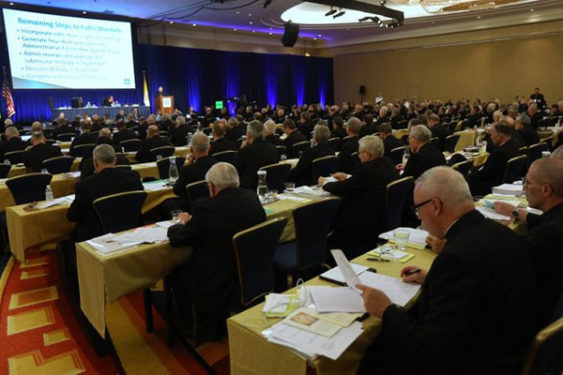
By Christopher White, The Tablet’s National Correspondent
BALTIMORE – As the U.S. Catholic bishops inch closer to enacting new protocols for bishop accountability, they concluded the second day of their high stakes spring meeting by approving a measure to design a national third-party system for reporting claims against bishops.
The third party reporting system is meant to serve as a confidential mechanism, via telephone or online, for complaints against bishops for either abuse or its cover-up. The vote on Wednesday gives approval for the United States Conference of Catholic Bishops (USCCB) to develop a more detailed reporting system before a full vote by the bishops later this year in November.
The administrative committee of the USCCB will vote in September on the financial and structural specifics before the November General Assembly.
Under the approved plan, the bishops committed to activating the third-party reporting system no later than May 31, 2020.
While the price tag has not been finalized, USCCB officials estimated that the new system would cost $30,000 for an initial set-up fee and $50,000 annually to maintain.
The reporting system will be managed by an independent body that will receive complaints that will be reported to the metropolitan (or regional) archbishop who, in accordance with Pope Francis’s new ‘motu proprio’, Vos estis lux mundi (“You are the light of the world”), is responsible for investigating claims against bishops.
Vos estis requires that local bishops’ conferences must establish a “public, stable and easily accessible” system for submitting abuse claims and also that the reports are sent to the metropolitans (or their senior suffragans if the report is against the metropolitan). In the United States, there are 32 territorial archdioceses (or metropolitans).
USCCB General Counsel Anthony Picarello told the bishops that the reason that the system will not go into place until next May is to give each metropolitan the time to establish the appropriate offices and individuals to receive the complaints. He said that May 31, 2020 is a ceiling to comply with the Holy See. However, if all the metropolitans had effective systems in place beforehand, they would allow for the possibility that it could launch sooner.
Cardinal Blase Cupich of Chicago urged that the implementation of the system be enacted with a sense of “urgency,” saying when similar mechanisms are implemented by corporations, they do so with haste.
“We all would like it done much sooner,” Cardinal Daniel DiNardo added.
During the discussions ahead of the vote, multiple bishops spoke of the need to guarantee effective advertising of the reporting system, adherence to civil law and appropriate authorities, and the ability for the mechanism to be able to field inquiries unrelated to abuse.
While dioceses throughout the country have their own local hotlines for reporting sexual abuse of priests or other improprieties, the new system would exist strictly for receiving complaints against bishops.
Archbishop Jose Gomez of Los Angeles and Vice-President of the USCCB said that the victims of abuse are the priority in this process, noting that while bureaucracy is necessary, it is to aid in the “healing process.”
On Thursday, the final day of their three-day gathering, the bishops will vote to enact new directives modeled after Vos estis, which will empower the metropolitan archbishop to investigate claims against abuse or cover-up by bishops with the support of lay experts.
At the start of the USCCB spring assembly on Tuesday, numerous questions were raised regarding the extent of the laity in bishop oversight.
Thursday’s final votes are widely expected to pass, however, consensus has yet to be reached on the lingering questions regarding lay involvement.
